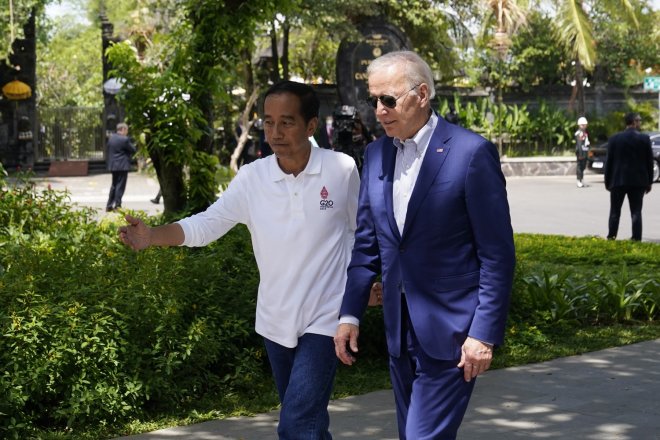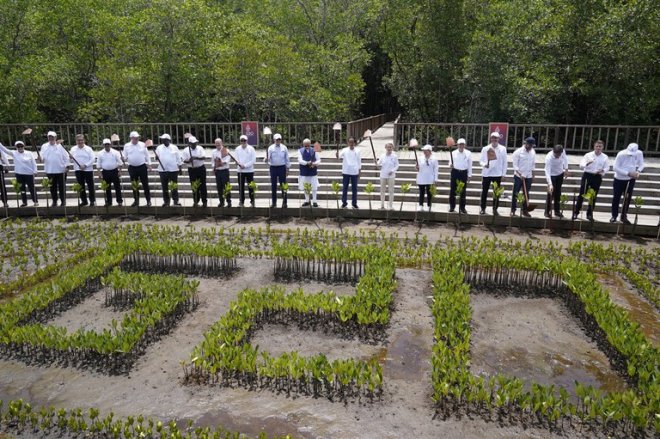
The Indonesian president led world leaders in a ceremonial planting of mangroves Wednesday to draw attention to the global climate crisis, but the final day of the G-20 summit on the tropical island of Bali was hijacked by the cold reality of conflict in Eastern Europe.
The war in Ukraine has overshadowed the two-day Group of 20 summit on the Indonesian island, with most of the grouping of the world’s largest economies poised to issue a strong condemnation of the conflict.
Although Russia appeared set to sign up to the G-20 declaration, it launched one of its biggest missile attacks on Ukraine during the nine-month war, killing at least one person in the capital, Kyiv, on Tuesday. Russian Foreign Minister Sergey Lavrov subsequently left the summit early.
Meanwhile, an unclaimed missile strike killed two people in a Polish village near the Ukrainian border. U.S. President Joe Biden called an "emergency roundtable" early Wednesday on the summit sidelines. Poland is a member of the NATO alliance.
Biden said after the meeting that it is "unlikely" that the missile was fired from Russia as “preliminary information” contested it.
"I don"t want to say that until we completely investigate, but it"s unlikely in the minds of the trajectory that it was fired from Russia, but we"ll see," the president said.
The meeting was joined by leaders of the U.K., the European Union, Spain, Germany, Canada, France, Italy, the Netherlands and Japan.
In a joint statement issued afterward, the leaders offered support for the Polish investigation, and had stern words about the Russian barrage Tuesday against Kyiv and other cities in Ukraine, calling them “barbaric.”
They reaffirmed “steadfast support” of Ukraine and remained ready “to hold Russia accountable for its brazen attacks on Ukrainian communities, even as the G20 meets to deal with the wider impacts of the war.”
Yurii Poita, a political analyst at the Kyiv-based think-tank New Geopolitics Research Network, said the timing of the attacks as world leaders met in Bali “show that Russia is ignoring the international community and mocking their concerns.”
“Those missiles did not hit military targets but civilian ones, especially the infrastructure,” Poita told RFA. He called the attacks “an attempt to create a humanitarian catastrophe.”
Conflict and economy
All this distracted from other themes of the G-20, including the world economy, digital transformation and climate change.
After the emergency meeting about the missile strike on Poland, leaders joined the summit host, Indonesian President Joko Widodo, in ceremonial planting of mangrove saplings on Bali.
Each leader was given a baby mangrove and followed detailed instructions about using feed bags and sticking them in the ground. Widodo, better known as Jokowi, hosted a tour of the nursery. Leaders heard about different species of mangroves and how they can live up to 100 years.
 Leaders raise their garden hoes for a group photo during a tree planting event at the Taman Hutan Raya Ngurah Rai Mangrove Forest, on the sidelines of the G-20 summit meeting, Wednesday, Nov. 16, 2022, in Denpasar, Bali, Indonesia. (AP Photo/Alex Brandon, Pool)Asked by a pool reporter whether he’d been briefed on the missile strikes on Ukraine, Jokowi insisted that “G-20 is an economic forum, a financial forum, and diplomatic forum, not a political forum.”
Leaders raise their garden hoes for a group photo during a tree planting event at the Taman Hutan Raya Ngurah Rai Mangrove Forest, on the sidelines of the G-20 summit meeting, Wednesday, Nov. 16, 2022, in Denpasar, Bali, Indonesia. (AP Photo/Alex Brandon, Pool)Asked by a pool reporter whether he’d been briefed on the missile strikes on Ukraine, Jokowi insisted that “G-20 is an economic forum, a financial forum, and diplomatic forum, not a political forum.”
“So here we talk about the economy," said the president.
Analysts say, however, that the issues are intertwined.
“If Russia truly cared about the effect of its actions on the global economy or on its standing within the G-20 or G-7, it would never have violated Ukrainian sovereignty to begin with,” Nina Jankowicz, vice president at the Centre for Information Resilience, an international NGO, told RFA.
In a summit declaration expected to be released at the end of the G-20, most of its leaders will condemn the war in Ukraine, according to a draft obtained by BenarNews, a news outlet affiliated with RFA.
The draft, which has yet to be signed, states: “Most members strongly condemned the war in Ukraine and stressed it is causing immense human suffering and exacerbating existing fragilities in the global economy.”
It also acknowledges different views among the G-20, noting that, “There were other views and different assessments of the situation and sanctions.”
“The declaration would further isolate Russia,” said Orysia Lutsevych, manager of the Ukraine Forum in the Russia and Eurasia Programme at Chatham House, an U.K.-based think tank.
“Russia’s attempt to create its own coalition and diminish U.S. leadership is failing spectacularly,” she said.
“It is also a big victory for Ukraine, as it tries to convince more countries to come forward with active support for Kyiv,“ Lutsevych said.
Russian top diplomat Lavrov, who represented Russia at G-20 in place of President Vladimir Putin, appeared to have accepted the text after pushing for an inclusion of “alternative viewpoints.”
He was quoted by RIA Novosti as criticizing Western countries for politicizing the document as “this is not at all the business of the G-20.”
Lavrov left the summit on Tuesday evening on a decades-old Russian Il-96 but his team said the departure was planned, TASS reported.
